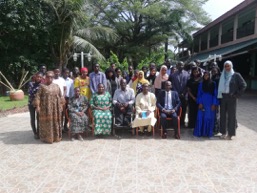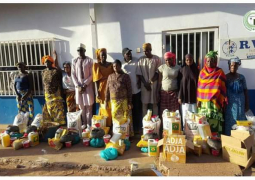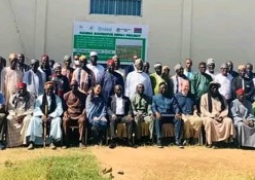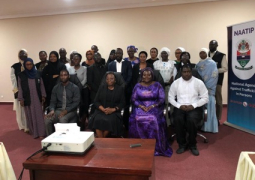
The forum was designed to equip participants with the requisite skills and knowledge to effectively identify, assist, and refer victims of trafficking-in persons. The event was part of activities commemorating of The World Day Against Human Trafficking, which is commemorated globally on July 30th.
Addressing the gathering, Isatou Dabo, executive director of The National Agency Against Trafficking-In Persons (NAATIP), expressed delight to welcome their stakeholders on important sensitization forum top not only share ideas, but also to know what their constraints are in respect of their day-to-day work and forge ahead.
The training, she added, is important for different reasons i.e many a time health and social workers do encounter persons who have undergone trafficking or survivors of trafficking may encounter health complications here and there.
“And if they don’t share their experience with family members, they would go to the hospitals for check-ups or otherwise. This make your role very important. For you may be their first point of call in the event they require a certain type of medical care.”
Madam Dabo, however, was quick to state that at this point, it doesn’t necessarily mean that they have shared their experience or ordeal with someone else.
“It is therefore important you are able to understand what the indicators are, be able to know what the signs are and if you see certain type of behavior either physical or by the person’s demeanor or character, you are able to know what particular services or treatment to offer and they types of questions to ask.”
She also spoke about the issue of prevention and protection, pointing out that are these are all part of psychosocial support and that social and health workers play a key when it comes to this aspect.
Dabo reminded that NAATIP cannot do this alone and that why is why they always solicit the support of stakeholders including the Ministry of Health, IOM and other key state actors.
She expressed optimism that at the end of the day, participants would be armed with the requisite tools to be able to identify what Trafficking-In Persons (TIP), indicators and tailored-out professional services to victims of TIP.
Saikou Ceesay, deputysing permanent secretary at the Ministry of Health, commended participants for their dedication to the wellbeing of people, saying their presence at the training reflects their commitment towards tackling one of the most pressing issues of ‘our time – human trafficking.’
“Today, we gather here to recognise the importance of training social and health workers in identifying, assisting, and referring victims of trafficking to appropriate services. This training marks a significant step forward in our collective efforts to combat this heinous crime and provide support to those who have suffered its devastating consequences.”
He reminded that human trafficking is a grave violation of human rights that affects millions of people worldwide, exploiting their vulnerabilities for the gains of traffickers.
The victims, he added, often trapped in a web of exploitation, face unimaginable physical, emotional, and psychological trauma.
“As social and health workers, it is our duty to be vigilant and proactive in recognising the signs of trafficking. The objective of today's training is to equip each and every one of you with the necessary skills and knowledge to effectively identify, assist, and refer victims of trafficking. By doing so, you will play a crucial role in breaking the chains of exploitation and providing survivors with the support and care they desperately need.”
“It is important to recognise that combating human trafficking requires a multidisciplinary approach, involving collaboration among various stakeholders. This includes law enforcement agencies, non-governmental organizations, and other relevant institutions. Your role as social and health workers is vital in this collaboration, as you are often at the forefront, engaging directly with vulnerable populations. Thus, your ability to identify and appropriately respond to trafficking situations can have a profound impact on the lives of countless individuals.”
Ousman George Badjie, Migration Management Unit, IOM representing Chief of Mission, lauded the initiative and commended participants for their dedication.
He reiterated that human trafficking remains a grave human right violation and that it is a threat to the security, safety and rule of law of people in the country.
Badjie revealed that every one year, thousands of men and women and children fall into the hands of traffickers and those vulnerable are the most targeted.
He thus called on them to intensify their campaign in a bid to combat the menace and make the country safe haven for all.
He expressed optimism that the training would greatly help participants effectively manage issues relating to TIP and indicators.
Jankoba Jabbie from Social Welfare, said the training would go a long way in their collective drive to combat Trafficking-in Person in the country.
He acknowledged that The Gambia like most countries in the region face the challenges of human trafficking, which require collective approaches to address.





